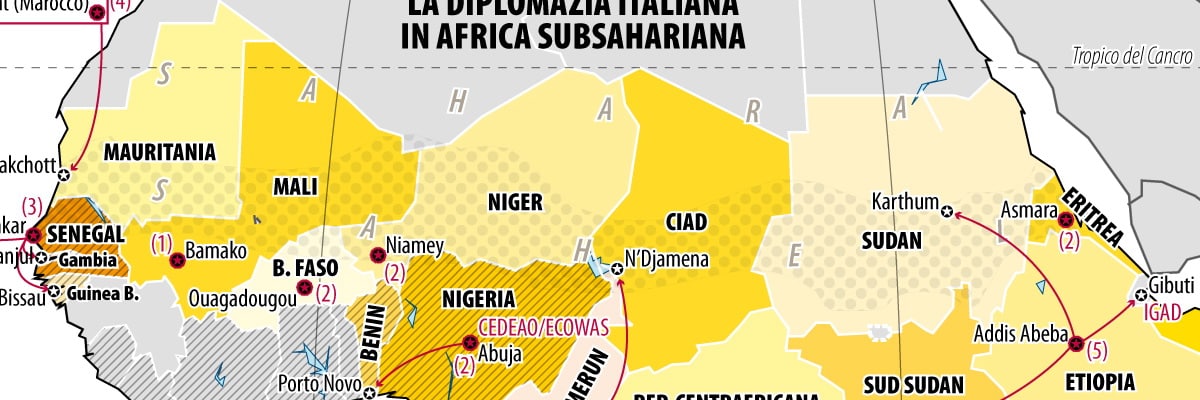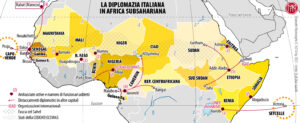The United Nations General Assembly was held in New York in late September in which Italy participated with a solid delegation led by Prime Minister Giorgia Meloni with Foreign Minister Antonio Tajani. Italy placed the theme of Africa and migration with emphasis, relaunching the need for a great "Mattei Plan," meant as a partnership and development project for the African continent with the stated goal of safeguarding the "right to not emigrate" of African populations.
For months now, in the face of increasingly numerous landings and a phenomenon that seems unstoppable, leading analysts have been wondering about the contents and resources of the Mattei Plan for Africa proposed by the Meloni government and which should then, in Italian expectations, be adopted by the European Union. Whatever the resources and content, for the Centro Studi Machiavelli there is one essential prerequisite for the success of a Mattei Plan or any other development plan in Africa: the consistency of the Italian diplomatic network in the Sahel. Strengthening it is a strategic priority, in terms of management and prevention of migration flows and with respect to the recrudescence of the security context, permeated by terrorist threats and violent extremism, and a general political instability also due to interference from external players whose goal is to destabilize the Old Continent with increasingly massive and, in the long run, unsustainable migration flows. It therefore becomes decisive to understand the nature and consistency of the Italian diplomatic network in the enlarged Sahel.
Italian diplomatic network in the Sahel
Currently, considering as Sahel the African belt straddling the band between the Tropic of Cancer and the Equator, the following somewhat lackluster picture emerges in terms of executive resources in the Ministry of Foreign Affairs (MAECI) supply chain-as per opensource sources and therefore ready to rectify them in case of inaccuracies.
Mauritania: since 2014, the country has been overseen by the Italian Embassy in Rabat (Morocco), where four diplomatic officials work.
Mali: the office in Bamako has been operational only since December 1, 2020 and, despite the geopolitical centrality of the country in terms of counter-terrorism and prevention of migratory flows, can only count on the presence of the Head of Mission and a contract unit; hence the concept of "laptop diplomacy," in the face, however, of structural priorities that would recommend greater coverage, as evidenced moreover by the continuing vacancy of the post of Deputy Officer.
Burkina Faso: Similarly, the embassy in Ouagadougou has been operational since February 2018 and only the Head of Mission (of the rank of Embassy Counsellor) serves there, assisted only by an administrative assistant from the MAECI roles and a single contracted unit under local law, in constancy with the vacancy of the Vicar Ambassador post.
Niger: The diplomatic leadership in Niamey is also represented solely by the Ambassador, who still lacks the assistance of a Vicarious Officer (being able to rely on a staff reduced to four local contractors). The Embassy in Niamey also houses a Military Attaché.
Nigeria: The Mission in Abuja relies on 2 diplomats (with the role of Vicar covered) but is weighed down by the burdens arising from the secondary accreditations in Porto Novo (Benin) and at ECOWAS/CEDEAO (Economic Community of West African States), thus the opportunity to reinforce the staff in terms of permanent secondment of an official at the multilateral level and/or in Benin.
Ciad: In the absence of a resident ambassador in N'Djamena, the Head of Mission in Yaoundé (Cameroon) has secondary accreditation in that country. However, it is worth noting that the Embassy in Yaoundé suffers from staff shortages (serving only the Head of Mission, of the rank of Embassy Counsellor, assisted by three functional areas), in the face of secondary accreditations not only in Chad but also in Malabo (Equatorial Guinea) and Bangui (Central African Republic). Again, there is the continuing vacancy of the post of Ambassador Vicar.
Senegal: The See in Dakar counts on a larger contingent of diplomats (3) in the face, however, of secondary accreditations in three capitals: Banjul (Gambia), Cidade de Praja (Cape Verde) and Bissau (Guinea Bissau).
Sudan: The Headquarters in Khartoum, evacuated on April 24, 2023, along with compatriots present in, has two diplomats and currently operates from Addis Ababa (Ethiopia). Instead, five diplomats work in the latter Headquarters, compared with secondary accreditations in Djibouti, Juba (South Sudan) and IGAD (Inter-Governmental Authority on Development).
Eritrea: The headquarters in Asmara, with two diplomats and in constancy with current network staffing forecasts, does not record vacancies in the precisely executive chain.
Kenya: The same goes for Nairobi, where three diplomats serve, but are called to manage secondary accreditations at UNEP (United Nations Environment Program), UN HABITAT (United Nations Human Settlements Program) and Port Victoria (Seychelles Islands).
Somalia: In Mogadishu, two diplomats serve and there is a vacancy for the post of third official. The headquarters houses a military attaché.
The first consideration in light of this picture is that of a very small numerical presence of career diplomats, a constant absence of Deputy Chief of Mission and reduced administrative staff, which can be summarized in the concept of "ambassador without an embassy." Here enters another element that needs to be deeply analyzed namely the reasons for the absence of young diplomats in the Sahel that are not only related to the staffing plan but rather to career expectations.
The absence of young diplomats in the Sahel
The chronic vacancy of Ambassador's Vicar positions in the countries of the Sahel/Sub-Saharan Africa belt (reserved, by arrangement, for young First Outgoing Second Secretaries and First Secretaries in the Second Location) is related to a suboptimal MAECI human resources management structure.
There are three reasons for this deficiency:
- Perception that the small headquarters is not useful for career advancement: young diplomats see an extension of their stay in Rome as more useful for a future assignment to larger headquarters, perceived as prestigious and with a "stronger" head of mission for the purpose of obtaining performance evaluations instrumental to career "escalations."
- Limitation on the contingent of Legation Secretaries: the short-to-medium term outlook indicates major difficulties in sliding even to the next rank of Legation Counsellor, given the near exhaustion of the contingent of posts in that rank. In fact, there are now 192 Legation Counsellors in service compared to a maximum contingent of 261 from the headcount. The annual hiring trend of about 50 Legation Secretaries will evidently run into a "bottleneck" given by the aforementioned depleting quota. trend di assunzioni annuali di circa 50 Segretari di legazione andrà evidentemente a scontrarsi con un “collo di bottiglia” dato dal suddetto contingente in esaurimento.
- Disproportionate responsibilities compared to experience in small locations: compared to service in a large embassy, taking on vicarious functions in small sub-Saharan embassies entails very considerable profiles of responsibility in civil, administrative and criminal matters, which the young diplomat is obliged to access often without the necessary, prior training.
The serious staffing shortages may be only partially mitigated by the very recent recruitment of more than 700 staff in the Second Functional Area, hopefully to be directed in operational time to priority diplomatic-consular theaters. Indeed, these profiles will not be able to be given positions of particular responsibility.
Possible corrective actions
The picture described highlights significant human resource management criticalities in the Italian diplomatic sector, particularly with regard to the distribution and expectations of young diplomats assigned to the Sahel and sub-Saharan regions. Some possible courses of action to address these issues are outlined below.
Short-term interventions:
- Enhancement of positions in peripheral locations: the Board of Directors of the Farnesina should enhance the value of service rendered in locations considered peripheral or complex by assigning higher scores in performance evaluation in order to incentivize the choice of these destinations by young diplomats.
- Specific training: ensure adequate and specific training for diplomats destined for positions of responsibility in small embassies, so as to adequately prepare them for the tasks they will have to perform, including security.
Medium-term interventions:
- Reconsideration of career policies: revise career policies to make service in African and Sahelian posts more attractive, such as by introducing economic incentives or accelerated career paths for those who choose to serve in these regions.
- Economic Incentives: reconsider and enhance economic incentives for service in African posts to adequately compensate for the risks and responsibilities borne by diplomatic personnel in these posts.
Long-term interventions:
- Regulatory changes: work to make the necessary legislative and normative changes to allow for an expansion of the headcount, not only to the rank of Minister, but also to that of Embassy Counselor, in order to ensure adequate coverage of available positions.
- Staff expansion: provide for an effective expansion of the diplomatic staff, to ensure a more robust and widespread presence in Africa and the Sahel, without overburdening the individual diplomat with responsibilities and roles.
- Career development programs: create clear and transparent career development programs that recognize and reward service in African and Sahelian locations in order to incentivize the choice of these destinations and encourage staff retention in these locations.
Conclusions
Resolving these critical issues will require a joint effort on the part of all the institutions involved, as well as a long-term commitment to reforming and improving human resource management in the diplomatic sector, in order to ensure an effective and sustainable Italian presence in the African and Sahelian regions, which is fundamental for the success of the "Meloni/Mattei Plan for Africa" and for the realization of Italian foreign policy objectives.
In conclusion, the current situation at MAECI is extremely deficient both in terms of numbers and career profiles and also in terms of specialized training, making it unsuitable to support a Meloni/Mattei Plan for Africa.
Direttore per le Relazioni internazionali del Centro Studi Politici e Strategici Machiavelli. Deputato nelle legislature XV, XVI, XVII, XVIII e Sottosegretario agli Affari Esteri durante il Governo Conte I. Laureato in Economia (Università di Firenze), Master in Business Administration (Università Bocconi), dirigente di azienda bancaria.










Scrivi un commento